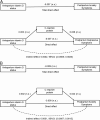Associations Between Early-Pregnancy Vitamin D Status and Postpartum Depressive and Anxiety Symptoms
- PMID: 38973743
- PMCID: PMC11460759
- DOI: 10.1097/PSY.0000000000001328
Associations Between Early-Pregnancy Vitamin D Status and Postpartum Depressive and Anxiety Symptoms
Abstract
Objective: Maternal postpartum depressive and anxiety symptoms are risk factors for subsequent maternal and child mental health problems. Little is known about the potential role of antepartum vitamin D and C-reactive protein (CRP) in the etiology of maternal postpartum affective symptoms. We investigated associations between antepartum vitamin D status and postpartum depressive and anxiety symptoms and whether antepartum CRP mediated these associations.
Methods: In 2483 participants of the Amsterdam Born Children and their Development prospective cohort, maternal serum vitamin D and CRP were measured at a median of 13 weeks' gestation. Vitamin D status was defined as deficient (≤29.9 nM), insufficient (30-49.9 nM), sufficient (50-79.9 nM), or normal (≥80 nM). Maternal depressive symptoms (Center for Epidemiologic Studies-Depression) and anxiety (State-Trait Anxiety Inventory) were assessed 3 months postpartum.
Results: After adjustments for confounders, vitamin D deficiency was only associated with increased postpartum anxiety symptoms ( B = 0.17, 95% confidence interval [CI] = 0.03-0.30, p = .017) compared to normal vitamin D levels (≥80 nM). In women not taking vitamin D supplementation ( n = 2303), vitamin D deficiency was associated with increased postpartum depressive and anxiety symptoms ( B = 0.14, 95% CI = 0.03-0.28, p = .045; and B = 0.17, 95% CI = 0.03-0.32, p = .015). Antepartum CRP did not mediate these links.
Conclusions: We found some evidence that antepartum vitamin D deficiency was associated with increased postpartum affective symptoms, especially in women not taking vitamin D supplementation. Clinical trials should determine whether vitamin D supplementation can reduce the risk for postpartum affective disorders.
Copyright © 2024 The Author(s). Published by Wolters Kluwer Health, Inc. on behalf of the American Psychosomatic Society.
Figures

Similar articles
-
Is Serum Vitamin D Associated with Depression or Anxiety in Ante- and Postnatal Adult Women? A Systematic Review with Meta-Analysis.Nutrients. 2024 Oct 26;16(21):3648. doi: 10.3390/nu16213648. Nutrients. 2024. PMID: 39519482 Free PMC article.
-
Maternal early-pregnancy vitamin D status is associated with maternal depressive symptoms in the Amsterdam Born Children and Their Development cohort.Psychosom Med. 2012 Sep;74(7):751-7. doi: 10.1097/PSY.0b013e3182639fdb. Epub 2012 Aug 9. Psychosom Med. 2012. PMID: 22879429
-
Association of antepartum vitamin D deficiency with postpartum depression: a clinical perspective.Public Health Nutr. 2020 May;23(7):1173-1178. doi: 10.1017/S136898001800366X. Epub 2019 Jan 18. Public Health Nutr. 2020. PMID: 30657106 Free PMC article. Review.
-
Vitamin D deficiency and depressive symptoms in pregnancy are associated with adverse perinatal outcomes.J Behav Med. 2018 Oct;41(5):680-689. doi: 10.1007/s10865-018-9924-9. Epub 2018 Apr 18. J Behav Med. 2018. PMID: 29671167
-
Vitamin D levels and perinatal depressive symptoms in women at risk: a secondary analysis of the mothers, omega-3, and mental health study.BMC Pregnancy Childbirth. 2016 Aug 3;16(1):203. doi: 10.1186/s12884-016-0988-7. BMC Pregnancy Childbirth. 2016. PMID: 27485050 Free PMC article. Clinical Trial.
Cited by
-
Is Serum Vitamin D Associated with Depression or Anxiety in Ante- and Postnatal Adult Women? A Systematic Review with Meta-Analysis.Nutrients. 2024 Oct 26;16(21):3648. doi: 10.3390/nu16213648. Nutrients. 2024. PMID: 39519482 Free PMC article.
-
Relationship Between Vitamin D Deficiency and Postpartum Depression.J Pers Med. 2025 Jul 4;15(7):290. doi: 10.3390/jpm15070290. J Pers Med. 2025. PMID: 40710407 Free PMC article. Review.
References
-
- Dennis CL, Falah-Hassani K, Shiri R. Prevalence of antenatal and postnatal anxiety: systematic review and meta-analysis. Br J Psychiatry 2017;210:315–23. - PubMed
-
- Walker AL de Rooij SR Dimitrova MV Witteveen AB Verhoeven CJ de Jonge A, et al. . Psychosocial and peripartum determinants of postpartum depression: findings from a prospective population-based cohort. The ABCD study. Compr Psychiatry 2021;108:152239. - PubMed
-
- Ebeid E, Nassif N, Sinha P. Prenatal depression leading to postpartum psychosis. J Obstet Gynaecol 2010;30:435–8. - PubMed
MeSH terms
Substances
LinkOut - more resources
Full Text Sources
Medical
Research Materials
Miscellaneous

